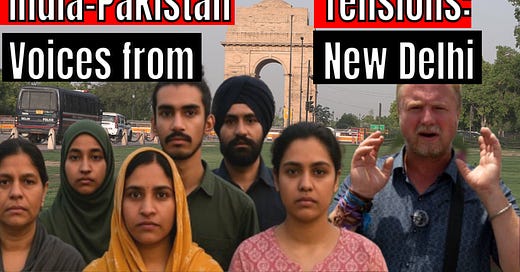TO BE CLEAR. I am documenting the INDIA perspective here. Get information on both sides. Do not only rely on my reports. Get information from the Pakistan side too
By Patrick Lancaster – Independent Crowdfunded Journalist Reporting From India
As tensions between India and Pakistan surged after the deadly April 22 terror attack in Kashmir, I traveled to the heart of New Delhi to hear directly from the people. My latest video report, “India Pakistan Frontline Combat and Ceasefire: What People Think In New Delhi”, documents powerful and often emotional voices from everyday citizens — cart drivers, students, shopkeepers, and even children — reacting to the violence, the ceasefire, and the road ahead.
Aftermath of a Massacre: April 22 Terror Attack
Multiple citizens referenced the April 22 attack in Kashmir, where 26 innocent civilians were killed, one of them a Christian. The attack has shaken public sentiment. One man told me:
“This was not a normal terrorist attack. They asked if you were Hindu. If you were, they shot you.”
The response from Delhiites was passionate and in many cases, enraged. People spoke of the pain and fear the attack instilled, with some advocating for stronger retaliation and others blaming Pakistan directly for harboring and supporting terrorism.
Airstrikes and Ceasefire: Public Reactions
Following the terror attack, Indian military strikes reportedly targeted key locations in Pakistan, including Rawalpindi and Karachi. Many expressed satisfaction and pride in the Indian response:
“Personally, I’m happy with the counter-attacks. This government took solid action.”
Others noted that only international intervention — especially from the United States — halted a full-scale war.
“There’s only a ceasefire because of Trump and the US,” one man claimed. “Otherwise, this would still be going.”
“Pakistan Should Be Erased”: Radical Voices and Widespread Distrust
Some interviewees went even further, with extreme statements:
“Pakistan should be erased... It’s a terrorist country. Worse than Afghanistan.”
Many accused Pakistan of not changing its ways, predicting that future attacks are inevitable and warning that India must remain on guard. Some even expressed dismay that Western countries, including Christian nations, had not responded more forcefully to the killing of a Christian victim.
Tourism, Fear, and Daily Life Interrupted
The economic ripple effect was also visible. From cart drivers to street vendors, many lamented the loss of business:
“This is tourist season. But tourists are scared. India Gate is empty.”
Vendors described police security, bag restrictions, and fear keeping locals and tourists away. A fatherly figure told me:
“People save all year for vacations. Now all that money and hope are wasted.”
Youth and Optimism: “The Future Will Be Calm”
Among the strong words and heavy concerns, there were also voices of hope. A 13-year-old boy, Rudra from Gujarat, told me:
“Now it’s all okay. Because the ceasefire is done. Everything will be calm in the future.”
Several other locals echoed this optimism, believing that as long as Prime Minister Modi and the Indian military remain strong, peace and progress are possible.
Nuclear Fear or Political Theatre?
While some residents raised concerns about Pakistan’s nuclear threats, most dismissed them as rhetorical. A few were defiant:
“If they nuke us, we’ll still finish them.”
Others feared escalation:
“A nuclear war will affect the whole world. The UN must help eliminate terrorism before it’s too late.”
America, Business, and Perceived Double Standards
Some interviewees criticized the United States, suggesting that it benefits from ongoing tensions:
“America wants the war to continue. Their tanks and cannons sell in both India and Pakistan.”
Others called for U.S. leadership in ending terrorism and supporting India’s stance on reclaiming Pakistan-Occupied Kashmir (POK).
“Pakistan Will Not Change”: Cynicism and Resilience
Over and over, Delhi residents repeated one idea:
“Pakistan will never change. They’ll keep funding terrorism. But we’ll remain strong.”
Some called for Balochistan’s independence, viewing it as a key to dismantling Pakistan’s terror infrastructure. China’s role in the region — especially its investments in Pakistan — also drew attention and criticism.
My Mission: Unfiltered Truth from the People
I didn’t come to give my opinion — I came to listen.
This report is part of a broader effort to show the human side of geopolitical conflict. I’ll be moving closer to the frontlines soon to bring you even more perspectives, not from pundits or politicians, but from the people themselves.
Please continue to support my independent, crowdfunded reporting. Like, share, and subscribe. Comment below with what you want me to cover next.
I’m completely independent. No networks. Just truth.
✔️ Subscribe to my Substack for full reports and behind-the-scenes stories:
🔗
✔️ Support my work with a ONE TIME donation — every bit helps me keep reporting from the front:
🔗SUPPORT MY JOURNALISM WITH A MONTHLY DONATION













Share this post